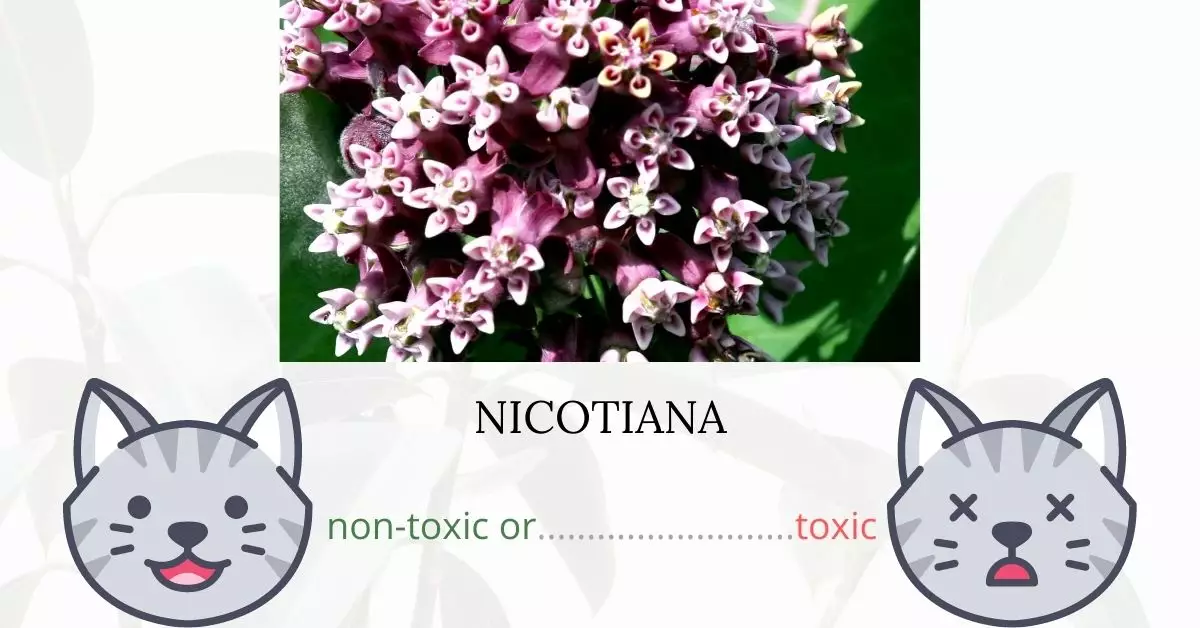Yes, Nicotiana, commonly referred to as Tree Tobacco, Tobacco, or Mustard Tree, is toxic to cats. With the exception of its seeds, the Nicotiana plant contains high levels of the poisonous alkaloids nicotine and anabasine. These compounds can stimulate and then depress the neurons in skeletal muscles, heart, and respiratory organs, potentially leading to respiratory paralysis.
To ensure the highest accuracy and relevancy of the information presented, this article was crafted in collaboration with a team of experienced DVMs (doctors of veterinary medicine). Their expertise enables us to offer in-depth insights into the potential risks associated with various plants, focusing here on Nicotiana and its effects on cats. In addition, we have sourced data from high-authority websites such as ASPCA and PetMD to ensure that every detail regarding the plant’s toxic properties is accounted for.
It’s worth noting that each Nicotiana plant’s toxin concentration can vary based on several extrinsic factors, including soil type, cultural conditions, and environmental circumstances. As the plant matures, the amount of poison it produces typically increases. Research indicates that the nicotiana plant can contain between two to eight percent nicotine, with the leaves harboring 60 percent of this poison. Approximately 22 percent is present in the flowers and roots, while the stem contains about 18 percent.
Clinical Signs of Nicotiana Poisoning in Cats
When a cat comes into contact with, inhales, or ingests any part of a Nicotiana plant, except for the seeds, they can exhibit a range of clinical symptoms due to the presence of poisonous alkaloids such as nicotine and anabasine. Nicotine acts slowly, initially stimulating and then subsequently depressing the neurons in skeletal muscles, the heart, and respiratory organs, potentially causing serious complications. In some severe cases, death may occur before any symptoms manifest, especially if a large quantity has been consumed. Here’s a detailed look at the clinical signs and the underlying causes:
- Vomiting and Diarrhea: Caused by the irritation of the gastrointestinal tract due to the toxic components, leading to the expulsion of the ingested material.
- Slow Pulse and Hypertension: The toxic compounds can affect the cardiovascular system, causing an alteration in heart rate and elevated blood pressure.
- Dizziness and Faintness: The neurological impact of the toxins can lead to altered equilibrium, making the cat appear disoriented or unsteady.
- Malaise and Depression: The cat might appear lethargic, showing a general sense of discomfort and lack of interest in its surroundings due to the toxic effects on its system.
- Hyperexcitability and Loss of Coordination: The initial stimulation of neurons can lead to erratic behavior and impaired movement coordination.
- Collapse and Weakness: The subsequent depressive effect of the toxins on the neurons can lead to a lack of energy and muscle strength, causing the cat to collapse.
- Myalgia and Diaphoresis: The toxins can lead to muscle pain and increased sweating due to their impact on muscle tissues and sweat glands.
- Mental Confusion: The toxic compounds can interfere with normal brain function, causing disorientation and confusion.
- Respiratory Muscle Paralysis and Respiratory Failure: As the toxins depress the neurons in respiratory organs, they can lead to the paralysis of respiratory muscles and, in severe cases, failure of the respiratory system.
- Asystole and Death: In extreme cases, the poisoning can lead to a complete cessation of the heart’s electrical activity, followed by death.
Given the severe risks associated with Nicotiana poisoning, it is crucial to monitor cats closely and seek immediate veterinary attention if any of the above signs are observed, even if the amount ingested is presumed to be small.
First Aid and Treatment of Nicotiana Poisoning in Cats
Nicotine and anabasine toxicity has no definitive antidote. Treatment is mostly symptomatic and supportive, with a focus on respiratory care because acute respiratory failure is usually often the cause of mortality. In addition, activated charcoal can be used to neutralize ingested nicotine in the stomach. The vet will continuously monitor the cat for signs of worsening neurological discomfort and treated it as needed.
Nicotine can also be diluted with a diluted potassium permanganate solution in the lavage fluid. To avoid shock, the cat should be relaxed and kept warm after the permanganate washing. If needed, the vet will use artificial respiration to keep the patient breathing.
If the cat is showing symptoms of parasympathetic or sympathetic hyperactivity, the vet will use atropine and phentolamine and administer it either intravenously or intramuscularly. For cardiac arrhythmia, the vet may treat it using propranolol. If hypotension does not respond to standard treatment, patients with convulsions may require sedation and vasopressor medications.
Recovery from Nicotiana Poisoning in Cats
While the prognosis is favorable with prompt treatment, the unfortunate reality is that most cats ingesting a potentially deadly quantity of nicotine or anabasine will go undetected until clinical indications appear.
After clinical indications appear, the feline may be able to recover, but only if only a little amount of poison was taken. In the instance of consumption of a huge nicotiana plant, the toxin will make its way through the feline’s body and cause death before clinical indications appear.
Prevention of Nicotiana Poisoning in Cats
It is best to keep your cat indoors, particularly if you are living in an area where tobacco trees grow wildly. If you are using tobacco products, keep them in a place where your cat cannot access them.
If you love plants but have cats at home, check out these lists:





